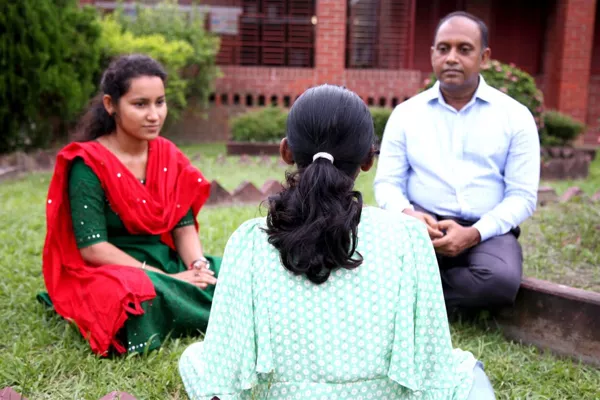Breaking the silence: Arsha’s journey to mental wellness in Bangladesh

"My mother passed away before my eyes. There was violence in my house when I was growing up. I was two years old then. While some may believe that people can't recall events from their early years, that's not entirely true. I still carry the memories of that painful moment with me," - Arsha*
Children depend on their families and parents for safety and security. When children grow up in unstable families such as Arsha’s, where they have experienced trauma and seen violence, they come under an increased risk of having long-term mental trauma that can reduce their chances of living a happy and fulfilled life. While across the world, we are just learning about mental health, in many societies and cultures, mental health is seen as a stigma, and people are expected to brave it out instead of delving into their problems.
A UNICEF study from 2021 study says around 14% of adolescents and 19% of children in Bangladesh experienced emotional distress during the COVID-19 pandemic globally. According to the National Mental Health Survey of Bangladesh in 2018-2019, less than 2% of adolescents are receiving mental health services. The stigma surrounding mental health remains a pervasive issue. It often manifests as a reluctance to discuss mental health openly and seek help, leading to misinformation and fear.
Arsha came to SOS Children’s Villages in Bangladesh at age two after her mother was murdered and her dad was incarcerated. Arsha had to learn to live without both her parents. Growing up in the Village, Arsha’s development indicators were normal. However, as Arsha got older, her trauma resurfaced and caused disruption.
Arsha’s caregiver, who was with her through her struggles, shares:
“When she was seven years old, I noticed the first signs of her troubles. She would toss and turn the whole night and be unable to sleep. The next day, she would be unable to go to school or attend school as she would be irritable and groggy. She could not behave normally at such times with her siblings or classmates and would pick fights. One time, she bit a classmate, and I had to rush to school to pick her up.”
As an adolescent, Arsha started lagging in her regular activities. She was anxious and always restless. Her recurrent nightmares would make her break into a sweat and wake up shouting at night. Her teachers and caregivers started noticing frequent temper tantrums and destructive behaviour. Arsha also could not continue her daily activities, such as her studies or domestic responsibilities. Fortunately for Arsha, she was surrounded by caregivers who were trained in mental health support and who understood that her behaviour was a symptom of mental distress.
Arsha was referred to a psychiatrist by the village counsellor and began therapy sessions immediately as a part of her treatment. The village counsellor would counsel Arsha and help her family understand what they needed to do to help her recover. Therapy became Arsha’s safe space to discuss her fears and worries. Slowly working with the psychologist, Arsha started chipping away at her childhood trauma and replacing it with trust in the world and people. In her sessions, Arsha was also told about the mind-body connection and how her issues, even though they were mental, were stored in her body and how they were affecting her physical wellbeing as well.
Arsha has been attending regular counselling sessions and taking medication since the end of 2020. Now, with the support of her SOS family, counsellor, and friends, Arsha has more agency in dealing with her healing and her appointments have become less frequent. Her experience taught everyone around her that seeking help and talking about mental health are signs of courage, not weakness. By talking openly about her mental health challenges, Arsha deepened her connections with her caregivers and siblings. They became a support network that understood her struggles and gave her the appropriate space.
“My sister has suffered a lot and is now doing better. We are all with her in her difficulties. She has become an inspiration on how to deal with mental health. At one point, I was going through something that seemed so troubling that it was bringing me down; that’s when I felt I must talk to someone just like my sister did. It is human to feel overwhelmed and ask for help.” shared Saba, Arsha’s sibling.
“Arsha has understood that mental wellness is an ongoing journey that requires self-compassion and resilience. She has also realized that sharing her experiences of seeking support could help others who might be facing similar struggles.” - Abu Sayed
SOS Children’s Villages Bangladesh recognizes the growing challenges of mental health among children and young people. It has been actively involved in mental health and psychosocial support (MHPSS) programs to address the psychological and emotional needs of children and families affected by various challenges.
With a multifaceted approach, SOS Children’s Villages Bangladesh has offered counselling to 195 individuals and 246 groups since 2021. Additionally, 129 workshops and training sessions have been held to equip children, caregivers, and community members to manage stress better and build healthier relationships through our Family Strengthening Programs.
Tanusri Bose Soma, Mental Health Coordinator at SOS Children’s Villages in Khulna, shares:
“With the focus on creating safe spaces, providing counselling services, and promoting emotional wellbeing, the programs aim to enhance the resilience and coping skills of children, caregivers, and the community, especially for those who have faced trauma, displacement, or other adverse circumstances.”
Eventually, the goal is to reduce the stigma so everyone can access mental health care and live a healthy and fulfilled life.
*Name changed to protect privacy.
